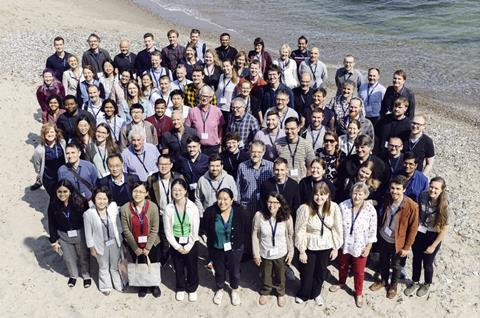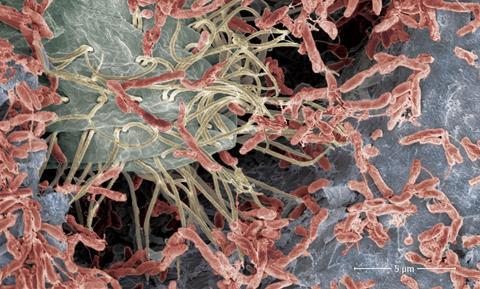The new not-for-profit open access journal Sustainable Microbiology is to run a themed collection on ’Electromicrobiology: emerging options for sustainable developments within electronics, energy, climate, and environment’.
The initiative by the Applied Microbiology International (AMI) publication will be a follow-up on the Electromicrobiology 2023 conference and workship which took place in Denmark in May and was supported by AMI’s journal Sustainable Microbiology.

Eighty scientists from 14 countries gathered at Aarhus University for the three-day interdisciplinary meeting, spanning the fields of microbiology, electrochemistry, bioengineering and physics, to hear contributions from 28 speakers and peruse 50 posters.
Ahead of the event, 17 participants (mostly postdocs and PhD students) joined an intense two-day pre-conference Workshop for Early Career Scientists at Aarhus University’s Marine Biological Station in Rønbjerg for networking, a theoretical primer and hands-on introductions to Electromicrobiology, taught by some of the invited speakers and scientific board members.
“This proved an effective conference kick-off for newcomers and experienced electromicrobiologists alike,” explained Electromicrobiology 2023 scientific committee member Dr Andreas Schramm, professor.
Conference highlights
Conference topics ranged from electrically conductive biomolecules to microbial physiology to the ecology and application of electromicrobiological systems.
“Some of the conference highlights were the widespread occurrence of cytochrome nanowires in diverse bacteria and archaea, the characterization of a radically novel type of conductive wire in cable bacteria, and the innovative applications of electromicrobiology, including its coupling to sunlight,” Dr Schramm said.

AMI Journal Development Manager Lindsay Flook added: “Sustainable Microbiology was proud to sponsor Electromicrobiology 2023. This exciting interdisciplinary field of research is identifying novel applications for electroactive bacteria, including in alternative energy sources and bioremediation.
”This perfectly aligns with the remit of AMI’s new open-access journal, demonstrating the role of microbes in delivering UN Sustainable Development Goals. We are excited to be working with the meeting organisers, delegates and wider research community to bring together a themed collection of papers on topic.”
Themed collection
Delegates and the wider research community have been invited to contribute an article to the journal for the ’Electromicrobiology: emerging options for sustainable developments within electronics, energy, climate, and environment’ themed collection, which will be guest edited by Professors Annette Rowe, of Department of Biological Sciences, University of Cincinnati, Cincinnati, Ohio, USA; Yonggang Yang, of School of Life Science and Engineering, Foshan University, Foshan, China; and Lars Peter Nielsen and Andreas Schramm, of Center for Electromicrobiology, Aarhus University, Denmark.
The aim of Sustainable Microbiology is to demonstrate the current and future role of microbes in improving global economic, social, and environmental sustainability, by inviting high-quality papers that demonstrate the application of microbiology in the achievement of the UN sustainable development goals.
For anyone interested in submitting to the themed special edition, the submission deadline is 1 November 2023 and instructions to authors can be found here. All submissions must include a Sustainability Statement in which authors describe the ability of the scientific observations to help deliver specific impacts on sustainability, linking to one or more UN Sustainability Goals.
Topics
- Aarhus University
- Andreas Schramm
- Annette Rowe
- Applied Microbiology International
- Climate Action
- Early Career Scientists
- Economic Equality
- electromicrobiology
- Environmental Microbiology
- Healthy Land
- Industrial Microbiology
- Lars Peter Nielsen
- Microbial Biotechnology
- People News
- Publishing
- Research News
- Sustainable Microbiology
- UK & Rest of Europe







No comments yet